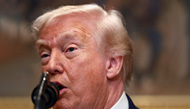A Carbon Credit Bank That May Be a Barrier
DOES RUSSIA HOLD hostage the future of a carbon cap-and-trade system that many experts see as a critical tool for curbing global greenhouse gases? Improbable as it may seem, the answer appears to be yes.
That is because Russia, as a result of the collapse of much of its heavy industry in the 1990s, owns one of the largest stocks of credits to offset carbon emissions.
The unearned windfall, a legacy of the Kyoto agreement that tried to deal with the threat of climate change, is worth several billion dollars. If abruptly sold abroad, those credits could send the price of carbon on the world’s fragile emissions markets plunging toward zero.
Most economists say that without a predictable and reasonably high price for carbon emissions there is little chance of setting in motion the many investments needed to shift from a carbon-intensive industrial economy to a more sustainable energy base in developed and developing countries alike.
Carbon trading is mainly based on permits that are issued or sold by governments to companies that emit carbon dioxide and other gases that are believed to affect the climate. The companies are required to buy permits, or seek credits elsewhere, if they emit more than a specified amount of carbon. They can profit by selling their permits for cash if they come in below their cap.
As governments lower the overall caps, the prices for permits and credits should rise. Supporters of carbon trading say that the system is working when companies facing high-cost permits cut their output, invest in cleaner technology or buy emissions credits from a company or organization that has taken actions to reduce emissions or absorb greenhouse gases from the atmosphere.
The main model for such a system already operates in the European Union, which has called on all industrialized countries to have systems in place by 2015 and for rapidly emerging economies like China and India to adopt them by 2020.
But even if a global market develops, many experts warn that carbon trading should not be relied on to deliver the scale of emissions cuts needed to keep the rise in global temperatures within a range that scientists say would prevent dangerous changes.
Environmental groups warn that carbon markets may end up providing only a fraction of the money some poor countries expect, largely because wealthy countries are not willing to set their caps stringently enough. Tougher caps would push up demand for more offsetting in the developing world. That, the theory goes, should raise the price of carbon, so that governments selling permits would have more money to redirect to a future global climate protection fund.
The prospect of Russia dumping its credits is just the latest challenge facing emissions trading.
Industrialized countries, including the United States, are counting on trading as the most inexpensive and efficient way to help meet future emissions targets intended to limit the carbon pumped into the atmosphere.
European leaders, meanwhile, have emphasized the role any trading project should play in channeling the large sums of money that poorer countries have demanded as a condition for a deal at Copenhagen.
Henry Derwent, the president of the International Emissions Trading Association, an industry group based in Geneva, predicted that an emissions market could be worth $3 trillion by the end of the next decade, compared with about $130 billion a year now.
In a number of countries, however, powerful lobbies, often backed by the coal industry, have blocked efforts to pass legislation to cap emissions. And where such systems have come into existence, particularly in Europe, the low prices and volatility in carbon markets have spooked investors rather than encouraged them to invest in clean energy.
There are also serious doubts about the way reductions in greenhouse gases can be earned, traded and managed, reinforcing the view that carbon markets may turn out to be just another Wall Street gambit.
“I do think that carbon markets have an important role to play,” said Nicholas Stern, a professor at London School of Economics and one of the world’s leading climate economists. But “all markets have to have some kind of regulation and rules in order to function properly,” he added. “We’ve surely seen that in the last few years - and this surely is one of them.”
Experts warn that carbon trading should not be relied on to deliver the scale of cuts needed to curb warming. A polluted skyline in Hong Kong. / MIKE CLARKE/AGENCE FRANCE-PRESSE — GETTY IMAGES
스마터리빙
more [ 건강]
[ 건강]이제 혈관 건강도 챙기자!
[현대해운]우리 눈에 보이지 않기 때문에 혈관 건강을 챙기는 것은 결코 쉽지 않은데요. 여러분은 혈관 건강을 유지하기 위해 어떤 노력을 하시나요?
 [ 건강]
[ 건강]내 몸이 건강해지는 과일궁합
 [ 라이프]
[ 라이프]벌레야 물럿거라! 천연 해충제 만들기
 [ 건강]
[ 건강]혈압 낮추는데 좋은 식품
[현대해운]혈관 건강은 주로 노화가 진행되면서 지켜야 할 문제라고 인식되어 왔습니다. 최근 생활 패턴과 식생활의 변화로 혈관의 노화 진행이 빨라지고
사람·사람들
more많이 본 기사
- ‘헉’ 오바마케어 보험료가 연 4만불?
- 가주서 노동법 위반 업주 처벌 대폭 ‘강화’
- ‘남가주 사랑의 교회’ 이원준 담임목사 부임
- LAPD “툭하면 발포”… 경관 총격 사건 올들어 급증
- 에어프랑스 엔진 화재 5천피트 급강하 ‘아찔’
- 엡스타인 파일서 지웠던 트럼프 사진 복원
- 트럼프, “100배 강력” 황금함대로 해군력 복원 시동·中 견제
- 김건희 특검팀, 뇌물 혐의 국토부 서기관에 징역 5년 구형
- 손흥민, 3년 연속 ‘KFA 올해의 골’… 볼리비아전 프리킥 득점
- 1,480원까지 돌파한 환율… “내년에도 고공 행진”
- 악명 높은 갱단 연루 한인 기소
- 재외공관들 성탄연휴 휴무 ‘제각각’
- 엡스타인 파일 파문 확산…정부 지연공개에 의회·피해자 공분
- 송성문, 샌디에고 입단 공식 발표… 4년 계약
- CBS ‘트럼프 눈치보기’?… ‘이민자 추방’ 보도 취소
- 내란전담재판부 설치법, 본회의 통과…정통망법 상정, 필버 돌입
- 국방부 인·태 차관보 한인 존 노 인준 통과
- 텍사스서 ‘의료수송’ 멕시코 해군 소형 항공기 추락…최소 2명 사망
- 연말 여행객 최다… LAX 공항 ‘대혼잡’
- 뉴욕, 마이애미 격파… 브런슨 괴력의 47점
- 미국 ‘제네시스 미션’에… 엔비디아·구글·오픈AI 총출동
- 한화, 미국서 소송 취하 상호관세 반환 내용
- 트럼프, 그린란드 특사 임명… 덴마크 “우리 영토” 반발
- 잃어버린 피부감각 되찾아준다… 유방재건, 의외의 효과
- 올해 AI로 전국 일자리 5만5,000개 증발
- 남가주 한인 ME
- BBQ, 옐프 선정 ‘가장 사랑받는 브랜드’ 3위
- 구글 혼자 삼성·SK 2배 투자… 반도체 투자 ‘국가 대항전’
- 수도여자중·고
- 중 부동산 공룡 ‘완커’ 손실급증·디폴트 위기
- 삼성 ‘엑시노스 2600’ 대량 생산… 2나노 파운드리 본격 가동
- 챗GPT, 이용자 나이 판별도구 도입
- 한인은행 신용도 ‘최우수’… 대다수 ‘별 5개’ 평가
- 베네수엘라 봉쇄에 금·은 값 또 최고
- 재미시인협회
- 공정위, 대한항공 마일리지 통합안 보완명령
- 아마존, AI에이전트 출시 수요예측·재고관리 기능
- 오픈AI 수익률 개선, 마진율 68%
- 샌프란시스코 대규모 정전 사태… 이틀만에 정상화
- [만화경] 안중근의사 유해봉환 사업
- 교육원, 가을학기 성인교육 프로그램 성료
- ‘아바타 3’ 개봉 첫 주부터 흥행
- “불모지에 뿌린 한국어 씨앗”
- AI로 가속화되는 노동시장 개편
- ‘크리스마스 캐롤’과 산타 클로스
- 가족 얼굴 못 알아보고 성격 변한 부모님… “서양 기준으론 정상?”
- 오후에 피다
- [정재민의 미디어풍경] 적과의 동침, 협력하며 경쟁하기
- “기부잔여신탁(CRT)의 놀라운 힘”
- [화요칼럼] 단호박의 온기
1/5지식톡

-
 미 육군 사관학교 West Poin…
0
미 육군 사관학교 West Poin…
0https://youtu.be/SxD8cEhNV6Q연락처:wpkapca@gmail.comJohn Choi: 714-716-6414West Point 합격증을 받으셨나요?미 육군사관학교 West Point 학부모 모…
-
 ☝️해외에서도 가능한 한국어 선생님…
0
☝️해외에서도 가능한 한국어 선생님…
0이 영상 하나면 충분합니다!♥️상담신청문의♥️☝️ 문의 폭주로 '선착순 상담'만 진행합니다.☎️ : 02-6213-9094✨카카오톡ID : @GOODEDU77 (@골뱅이 꼭 붙여주셔야합니다…
-
 테슬라 자동차 시트커버 장착
0
테슬라 자동차 시트커버 장착
0테슬라 시트커버, 사놓고 아직 못 씌우셨죠?장착이 생각보다 쉽지 않습니다.20년 경력 전문가에게 맡기세요 — 깔끔하고 딱 맞게 장착해드립니다!장착비용:앞좌석: $40뒷좌석: $60앞·뒷좌석 …
-
 식당용 부탄가스
0
식당용 부탄가스
0식당용 부탄가스 홀세일 합니다 로스앤젤레스 다운타운 픽업 가능 안녕 하세요?강아지 & 고양이 모든 애완동물 / 반려동물 식품 & 모든 애완동물/반려동물 관련 제품들 전문적으로 홀세일/취급하는 회사 입니다 100% …
-
 ACSL 국제 컴퓨터 과학 대회, …
0
ACSL 국제 컴퓨터 과학 대회, …
0웹사이트 : www.eduspot.co.kr 카카오톡 상담하기 : https://pf.kakao.com/_BEQWxb블로그 : https://blog.naver.com/eduspotmain안녕하세요, 에듀스팟입니다…
케이타운 1번가
오피니언
 조환동 / 편집기획국장·경제부장
조환동 / 편집기획국장·경제부장 AI로 가속화되는 노동시장 개편
 민경훈 논설위원
민경훈 논설위원‘크리스마스 캐롤’과 산타 클로스
 정재민 KAIST 문술미래전략 대학원 교수
정재민 KAIST 문술미래전략 대학원 교수 [정재민의 미디어풍경] 적과의 동침, 협력하며 경쟁하기
 김영화 수필가
김영화 수필가 [화요칼럼] 단호박의 온기
 김정곤 / 서울경제 논설위원
김정곤 / 서울경제 논설위원[만화경] 안중근의사 유해봉환 사업
 권지숙
권지숙 오후에 피다
 옥세철 논설위원
옥세철 논설위원말살되고 있는 유럽의 성탄절 전통, 그 원인은…

외로운 이웃들
 조지 F·윌 워싱턴포스트 칼럼니스트
조지 F·윌 워싱턴포스트 칼럼니스트 [조지 F. 윌 칼럼] MIT에 대한 트럼프의 무분별한 공격
1/3지사별 뉴스

빅애플 2025년 송년회
빅애플(대표 여주영)은 지난 19일 퀸즈 베이사이드 소재 산수갑산2 연회장에서 2025년 송년회를 열고 회원들간 화합과 친목을 도모했다. 이날…
재미 한인이산가족 상봉 길 열렸다

미주한인 이산가족 북한 고향 길 열려
“그리워하면 언젠가 만나게 되는…” 노래 가사처럼 그리워하면 다시 만날 수 있을까. 재미한인이산가족들은 그렇게 그리워하며 반세기가 넘게 기다리…
워싱턴 메트로지역 5세이하 아동인구 20년새 1.8%⇩

연말 ‘로드레이지’ 비극… 한인 총격 피살
연말을 맞아 도로 위에서 순간적으로 벌어진 운전 중 시비가 40대 한인 가장의 총격 피살 비극으로 이어졌다. 워싱턴주 레이시 경찰국과 서스턴 …
엡스타인 파일 공개 다음날 트럼프 사진 삭제…야당서 탄핵 경고

오늘 하루 이 창 열지 않음 닫기 






















































.png)


댓글 안에 당신의 성숙함도 담아 주세요.
'오늘의 한마디'는 기사에 대하여 자신의 생각을 말하고 남의 생각을 들으며 서로 다양한 의견을 나누는 공간입니다. 그러나 간혹 불건전한 내용을 올리시는 분들이 계셔서 건전한 인터넷문화 정착을 위해 아래와 같은 운영원칙을 적용합니다.
자체 모니터링을 통해 아래에 해당하는 내용이 포함된 댓글이 발견되면 예고없이 삭제 조치를 하겠습니다.
불건전한 댓글을 올리거나, 이름에 비속어 및 상대방의 불쾌감을 주는 단어를 사용, 유명인 또는 특정 일반인을 사칭하는 경우 이용에 대한 차단 제재를 받을 수 있습니다. 차단될 경우, 일주일간 댓글을 달수 없게 됩니다.
명예훼손, 개인정보 유출, 욕설 등 법률에 위반되는 댓글은 관계 법령에 의거 민형사상 처벌을 받을 수 있으니 이용에 주의를 부탁드립니다.
Close
x